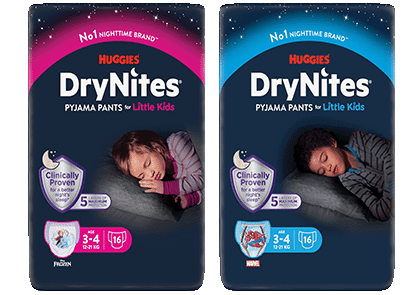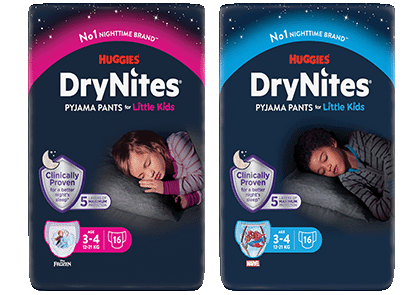
Get your free sample
How stress and anxiety affect your child’s bedwetting
Most experts agree that emotional stress can be a trigger for children or teenagers to start wetting the bed, even when they have been dry for months, or years.
Big upheavals and stresses in a child or teen’s life, whether at home or at school, can help explain why they start bedwetting. You might hear healthcare professionals refer to this as ‘secondary enuresis’.
How does stress lead to bedwetting?
The psychological causes of bedwetting are linked to the hormone vasopressin. This is the hormone the body produces to regulate how much wee we produce at night and is known to be affected by anxiety. When a child is anxious, their body can run low on vasopressin. This can then mean they might produce too much wee for the bladder to hold at night and increase the chance they might accidentally wet the bed.
Stress or anxiety may also cause your child to drink too much just before bedtime, or mean they forget to wee before they go to bed.
Why your child may be wetting the bed after starting school
Starting school is a special moment for your child, and one you should both be excited about. However, it can also be a bit overwhelming or upsetting. After all, it’s a lot of big changes to their routine, all at once! And this can cause stress or anxiety, along with bedwetting.
More often than not, if your child is wetting the bed after school, it is just a case of secondary enuresis, and nothing to worry about. They just need a little support to help them as they adjust.
Does bedwetting cause stress?
While stress and emotional upset can be factors in bedwetting, it’s also true that worrying about wetting the bed, especially for older kids, can be stressful in itself, leading to a bit of a vicious cycle. Sleepovers, family visits and trips away can all cause extra bedwetting anxiety, and this in turn can affect a child’s quality of life and mental health.
Can stress and anxiety cause bedwetting in young adults?
Yes. It’s estimated that bedwetting affects as many as 1 in 75 teens. We all know puberty can be a difficult time and the causes of teen bedwetting are usually stress related.
Try to talk to your teen sensitively about their worries and reassure them that they are not to blame. It’s important they know what they are experiencing is not unusual. In fact, teenage bedwetting is just another phase that happens to some kids—and they will grow out of it with the right support.
How to reduce stress and anxiety for your child
Bedwetting is a developmental stage that all kids go through, and it’s not always a straightforward journey. By using DryNites® Pyjama Pants and DryNites® Bed Mats—and with a little support from you—your child will go to sleep worry-free, and wake up awesome.
It’s time to take control of bedwetting
Start by choosing to support your child through this phase by learning more about what bedwetting is and why it happens.
Use this knowledge to give them the freedom they deserve, and don’t worry if the odd night-time accident occurs. Working with parents and subject experts, we’ve created a hub of information and solutions to help you manage bedwetting when they go to school, away on trips, have sleepovers and so much more.
Whatever age, stage or phase they are at, explore our bedwetting advice to find the support you need.



 your parenting partner
your parenting partner